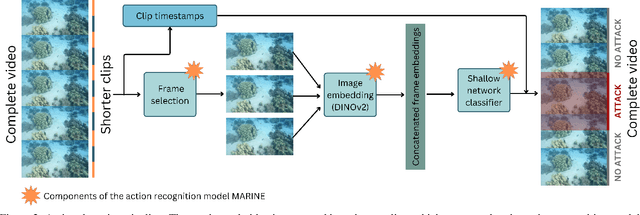MARINE: A Computer Vision Model for Detecting Rare Predator-Prey Interactions in Animal Videos
Paper and Code
Jul 25, 2024



Encounters between predator and prey play an essential role in ecosystems, but their rarity makes them difficult to detect in video recordings. Although advances in action recognition (AR) and temporal action detection (AD), especially transformer-based models and vision foundation models, have achieved high performance on human action datasets, animal videos remain relatively under-researched. This thesis addresses this gap by proposing the model MARINE, which utilizes motion-based frame selection designed for fast animal actions and DINOv2 feature extraction with a trainable classification head for action recognition. MARINE outperforms VideoMAE in identifying predator attacks in videos of fish, both on a small and specific coral reef dataset (81.53\% against 52.64\% accuracy), and on a subset of the more extensive Animal Kingdom dataset (94.86\% against 83.14\% accuracy). In a multi-label setting on a representative sample of Animal Kingdom, MARINE achieves 23.79\% mAP, positioning it mid-field among existing benchmarks. Furthermore, in an AD task on the coral reef dataset, MARINE achieves 80.78\% AP (against VideoMAE's 34.89\%) although at a lowered t-IoU threshold of 25\%. Therefore, despite room for improvement, MARINE offers an effective starter framework to apply to AR and AD tasks on animal recordings and thus contribute to the study of natural ecosystems.
 Add to Chrome
Add to Chrome Add to Firefox
Add to Firefox Add to Edge
Add to Edge